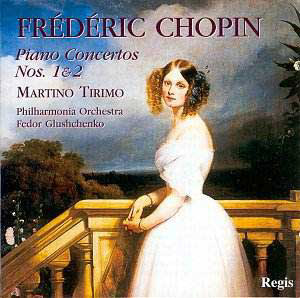Both concertos date from around 1830, and how amazingly
unlike Beethovenís Emperor they are. Piano writing was advancing
in leaps and bounds, diversifying in all directions as the instrument
itself developed in terms of its technology. Chopinís two concertos,
together with the Andante Spianato and Grande Polonaise, have
a reputation for shallow sparkle and turgid orchestration but both descriptions
are wholly inappropriate, especially when they are in the hands of sensitive,
informed performers. They have an endless stream of inventive melody,
lyric emotion and lithe energy, while such devices as col legno
(using the wooden part of the bow to strike the violinsí strings rather
than the hair to draw the sound) must represent, along with Berlioz
in his Symphonie fantastique from exactly this same period of
1830, an early departure from the conventional approach. Then thereís
the Polish dance (the Krakowiak in the finale of the first concerto)
to catch the spirit and rhythm of Chopinís homeland, which he left for
good at this time.
This is a very fine recording. Tirimo, who already
comes with an excellent reputation in Schubert playing, brings his translucent
technique to these vivid accounts. What particularly strikes one is
the partnership between soloist and orchestra in what are frankly purely
vehicles for a virtuoso to strut his or her stuff while the orchestra
takes on the role of an also-ran. Not so here. The Philharmonia are
in glowing form under Glushchenko, fabulous horn and bassoon solos,
warm string tone and immaculate accompaniment while Tirimo meanders
through the filigree forests of embellishment so typical of Chopinís
piano writing. Quite the finest playing since Vlado Perlemuter, whose
recently announced death at 98 robs us of one of the great Chopin exponents,
and definitely one for the shelves.
Christopher Fifield


